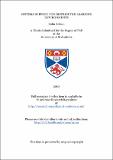Files in this item
Systems support for distributed learning environments
Item metadata
| dc.contributor.advisor | Dearle, Alan | |
| dc.contributor.author | Allison, Colin | |
| dc.coverage.spatial | 295 p. | en_US |
| dc.date.accessioned | 2018-06-25T10:10:04Z | |
| dc.date.available | 2018-06-25T10:10:04Z | |
| dc.date.issued | 2003 | |
| dc.identifier.uri | https://hdl.handle.net/10023/14519 | |
| dc.description.abstract | This thesis contends that the growing phenomena of multi-user networked "learning environments" should be treated as distributed interactive systems and that their developers should be aware of the systems and networks issues involved in their construction and maintenance. Such environments are henceforth referred to as distributed learning environments, or DLEs. Three major themes are identified as part of systems support: i) shared resource coherence in DLEs; ii) Quality of Service for the end- users of DLEs; and iii) the need for an integrating framework to develop, deploy and manage DLEs. The thesis reports on several distinct implementations and investigations that are each linked by one or more of those themes. Initially, responsiveness and coherence emerged as potentially conflicting requirements, and although a system was built that successfully resolved this conflict it proved difficult to move from the "clean room" conditions of a research project into a real world learning context. Accordingly, subsequent systems adopted a web-based approach to aid deployment in realistic settings. Indeed, production versions of these systems have been used extensively in credit-bearing modules in several Scottish Universities. Interactive responsiveness then emerged as a major Quality of Service issue in its own right, and motivated a series of investigations into the sources of delay, as experienced by end users of web-oriented distributed learning environments. Investigations into this issue provided insight into the nature of web-oriented interactive distributed learning and highlighted the need to be QoS-aware. As the volume and the range of usage of distributed learning applications increased the need for an integrating framework emerged. This required identifying and supporting a wide variety of educational resource types and also the key roles occupied by users of the system, such as tutors, students, supervisors, service providers, administrators, examiners. The thesis reports on the approaches taken and lessons learned from researching, designing and implementing systems which support distributed learning. As such, it constitutes a documented body of work that can inform the future design and deployment of distributed learning environments. | en_US |
| dc.language.iso | en | en_US |
| dc.publisher | University of St Andrews | |
| dc.subject.lcc | LB1028.5A66 | |
| dc.subject.lcsh | Computer-assisted instruction | en |
| dc.subject.lcsh | Education--Data processing | en |
| dc.subject.lcsh | Computer networks | en |
| dc.title | Systems support for distributed learning environments | en_US |
| dc.type | Thesis | en_US |
| dc.type.qualificationlevel | Doctoral | en_US |
| dc.type.qualificationname | PhD Doctor of Philosophy | en_US |
| dc.publisher.institution | The University of St Andrews | en_US |
This item appears in the following Collection(s)
Items in the St Andrews Research Repository are protected by copyright, with all rights reserved, unless otherwise indicated.

